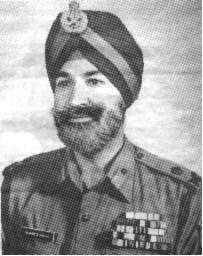Shabeg Singh
| Shabeg Singh | |
|---|---|
 Major General Shabeg Singh | |
| Birth name | Shabeg Singh Bhangu |
| Born |
1925 Khiala Kalan, Amritsar, Panjab |
| Died |
6 June 1984 Akal Takht, Amritsar, Panjab |
| Allegiance |
Sikh India |
| Service/branch | Army |
| Years of service | 1944 – 1977 |
| Rank | Major General |
| Unit |
Garhwal Rifles 3/Parachute Regiment 11 Gorkha Rifles |
| Commands held | GOC, Madhya Pradesh, Bihar and parts of Odisha |
| Battles/wars | Indo-Pakistani war of 1971 (India) and Operation Blue Star 1984 under Jarnail Singh Bhindranwale |
| Awards | AVSM and PVSM |
| Memorials | Gurdwara Yaadgar Shaheedan, Amritsar |
| Relations | Mehtab Singh Bhangu |
Major General Shabeg Singh Bhangu AVSM PVSM (1925 – 1984), was an Indian Army officer noted for his service in training of Mukti Bahini volunteers during the Bangladesh Liberation War.[1] [2][3]
Early life and education
Shabeg Singh was born in 1925 in Khiala village (earlier known as Khiala Nand Singhwala), about nine miles (14 km) from the Amritsar-Chogawan road. He was the eldest son of Sardar Bhagwan Singh and Pritam Kaur, and had three brothers and a sister. He was sent to the Khalsa College in Amritsar for secondary education, and later to the Government College in Lahore for higher education.
Military career
In 1942, an officers selection team visiting Lahore colleges recruited Singh to the British Indian Army officers cadre. After training in the Indian Military Academy, he was commissioned in the Garhwal Rifles as a second lieutenant. Within a few days the regiment moved to Burma and joined the war against the Japanese, which was then in progress. In 1945 when the war ended, Singh was in Malaya with his unit. After partition, when reorganization of the regiments took place, Singh joined the 50th Parachute Brigade of the Indian Army. He was posted to the 1st battalion of the Parachute Regiment, where he remained till 1959. He later commanded the 3rd battalion of 11 Gorkha Rifles.
Operation Blue Star
After his dismissal, Singh joined Jarnail Singh Bhindranwale.[4] He organised the Sikh militants present at the Harmandir Sahib in Amritsar in June 1984. Indian security forces launched Operation Blue Star to flush out the militants from the complex, and Singh was killed in the operation along with Maj. Amukurajah Das.
References
- ↑ Mahmood, Cynthia Keppley (November 1, 1996). Fighting for Faith and Nation. Series in Contemporary Ethnography. University of Pennsylvania Press. p. 81. ISBN 978-0812215922. Retrieved 30 May 2009.
- ↑ http://www.sikh-history.com/sikhhist/personalities/military/shabeg.html
- ↑ https://forums.bharat-rakshak.com/viewtopic.php?f=14&t=390&start=40
- ↑ Danopoulos, Constantine Panos/Watson, Cynthia. The political role of the military : an international handbook. Westport, Connecticut: Greenwood Press, 1996. p. 184